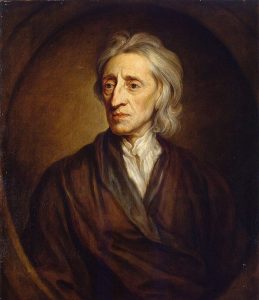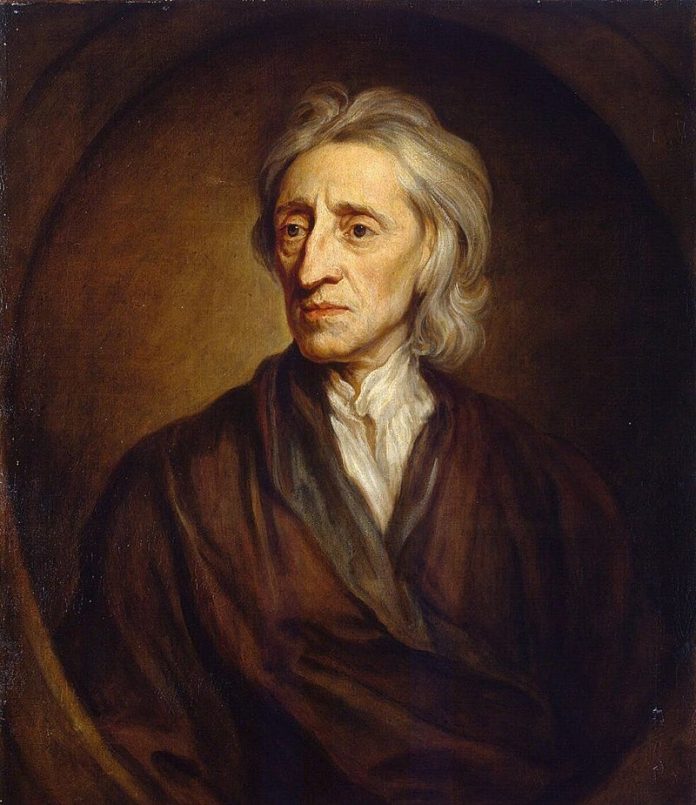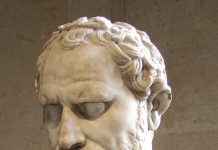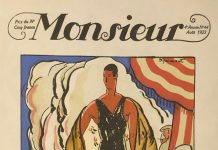“People who are born idiots will remain idiots, and those who are born brilliant will be idiots by the time they are grown”—so said someone who was once famous and now is dead. Who was also, incidentally, an idiot, but who, I am inclined to believe, was born brilliant. Anyways, exactly what we are born as is the topic, or at least one of them, of Coming To by Timothy Harrison, published by University of Chicago Press. According to the cover it is a book about consciousness and natality (which, I think the way Harrison uses it, may be defined as the experiences of fetal and just-born persons). It is dense to digest, and I will serve you no entrées in this review, only, let’s say, an amuse-bouche.
There are four primary figures which constitute his study of consciousness and natality “in early modern England”: Rene Descartes (one of my favorite philosophers), John Milton, Thomas Traherne (poet and theologian), and John Locke. Of course, it began, like so much in modernity, with Descartes and his creation of a new understanding of the word conscientia (consciousness). Descartes, in his sublime realization that the soul did not have parts, posited conscientia (consciousness) as the basis of all intellectual activity and re-purposed “an old Latin word in a new way.” Conscientia had usually been translated to mean conscience, or the knowledge of right and wrong (see Cicero’s writings, for instance.). Conscience was considered an evaluative faculty, a faculty which allowed the mind to evaluate what is right or wrong. Descartes did not posit conscientia as an evaluative faculty; it was simply the very foundation of thought. Though, “In England, the word consciousness was not used in a broadly Cartesian sense—as a self-referential property accompanying all thought—until late in the 1670s.” In the impact which such a conceptual repurposing had, thought came to encompass the intellectual activities of reasoning, will, emotion—“the least motion and stirring of our minde”. Such a repurposing as Descartes effected also led to the posing of a radical question: when does consciousness emerge? “Whereas. . . .Descartes’s philosophies employ fiction to illuminate concepts (mind, self, ego) in the space of reason, Milton’s and Traherne’s poems similarly isolate human thought, but do so by situating newly conscious life on the horizon of mimesis [creative representation]”. Mr. Harrison then proposes that Milton and Traherne and even Locke investigate the origin of consciousness through a mimetic (and in Locke’s case—minimally mimetic) way.

Milton’s project of Paradise Lost allowed him to explore the very beginnings of consciousness through the novelty of his Adam and Eve: Adam and Eve are newborns in the Garden of Eden (and so natal), but they are also newborn as fully mature physically, and fully endowed intellectually. Now, Milton (being a prolific heretic of Christianity) did not believe that Adam and Eve were possessors of infused knowledge; he believed that they were gifted with mature reason but that they knew reality only by interacting with it. Eve does not even know herself physically until she is told by Adam that she is gazing at her own body in a pool-mirror. The investigation of consciousness undertaken by Milton in its many facets (and comprehensively studied by Harrison) is illuminating; Milton mimetically concludes (through the personality of Adam) that in a world such as Eden, a world without pain and death, relation to the self in the form of self-preservation is “unnecessary”. In the vein of the philosopher Grotius (who was highly revered by the founding fathers incidentally), Adam’s driving instinct is one for peaceable and intelligent company; “an instinct that drives Adam outwards, toward others”, which causes Adam to request that God fashion Eve for him. It was always interesting to me that Milton’s greater artistic creation was Eve, because he was a rabid misogynist. Milton’s Eve too desires human society, but she seems more able to enjoy her own company than Adam, which is Eve’s most conspicuous Shakespearian characteristic. Shakespeare truly made his greatest personalities godlike when he enabled them to enjoy their own company endlessly (think Hamlet or Macbeth or Falstaff or Bottom or Puck), for the only other Personality (though I dare not say character) in Western literature who can enjoy His own company endlessly is Yahweh. Harrison coaxes from Milton’s epic his views on human nature, free will, reason and its relationship with instinct, and Adam’s consciousness that he was not self-begot. Satan, in Paradise Lost, asks Abdiel (a demon) whether he can know that he did not create himself: Satan devilishly concludes that because the demons were not aware of any time when they were not, they must have always been. Adam rather repudiates Satan’s Miltonic (pun intended) arrogance by acknowledging that he was not born of himself, for he can recount how it felt to come into the awareness of his own being. Adam “found” himself.
Traherne’s project is a perfect resemblance to Milton’s in this area. Traherne wanted to know whether there were any ways to return, in this life, to Adam’s original innocence and wonderment at the world: he concluded that there was a way—recalling (or perhaps imagining) the experience of being in the womb and being born into the world. Traherne, in a Cartesian manner, believed that thinking was the substance of the soul, insofar as thinking was the process of “aligning” perceptions with their proper realities. The chapters on Traherne are more expansive in intellectual investigation than Milton’s chapter; Descartes to Augustine, to Socinus (who also factors in Milton’s chapter) to others and many others. Traherne seems to disagree with Augustine quite a bit, which is a dangerous thing to do for any thinker. “Augustine explores infant experience only to stress its unavailability. . . .Traherne uses the capacity of imaginative thought, in its unlimited richness, to ‘be present there, with Adam in paradise’ at the moment he first awakens in order to bring readers as close as possible to the first spark of human consciousness”. That is, “Adam provides Traherne [and all people] with a way to imagine the details of a moment that the limitations of the human condition prevent him from knowing directly.” If there is any essential summary of Traherne’s ambition, that is it. But in keeping with my promise that I will serve no entrées in this review, we will now move on to Locke, who is the last person of this blessed trinity (Milton-Traherne-Locke).
Really, the philosophical focus of Locke is on his epistemology and his Essay Concerning Human Understanding; Harrison observes that “the importance of originary experience in Locke’s book has gone all but unremarked.” Locke traces (or wishes to trace) human consciousness to its inception, but being as he was an empiricist, he could not possibly “make positive claims about embryonic thought”. This creates a “tension”, as it is called by Harrison. Locke resolves Harrison’s tension by using limited access to poetry to construct an interaction with embryonic thought and sensation—a “minimally mimetic” project. Particularly the poetry of Thomas Gray is very Lockian in principle, and demonstrates how Locke’s principles may be poetically represented. Gray, for instance, wrote an account of the beginnings of consciousness in his poem De Principiis Cogitandi. Gray writes that while an infant is “still drugged with soft sleep and surrounded in warm fluid a slight breath has already stimulated his sense of touch and released his soul.” Gray recounts (as a faithful Lockian) how it is “touch” which is equal and equivalent to the release of the soul. But the originary experience versified in Gray’s poem is inaccessible to human beings who live now – empirically inaccessible. Locke’s epistemological theory is therefore realized through “the development of an imagined individual from the acquisition of his first ideas toward an intellectual maturity” [emphasis and bolding my own].
The second book of Locke’s Essay is the most mimetic of Locke’s epistemological project, for it explores the “psyche of infants and young children”. An odd undertaking indeed for an empiricist, but an undertaking which rewards his epistemology richly. I find Locke’s account convincing in many degrees, but I do not think he understands Descartes very well, or at least he cannot disprove him very competently. Anyways, Harrison is a comprehensive scholar. His writing is thoroughly academic and I need not say that I do not enjoy thoroughly academic writing. If you are intellectually patient than this book will be an excellent read: there are many powerful thoughts and technical insights on the poetry of Milton and the philosophies of Locke and Descartes. The arc of consciousness and its history is so wide that Harrison comes close to becoming an intellectual polymath as he leads the reader through his book. I have already found myself returning to it more than once.
Timothy M. Harrison is the Randy L. and Melvin R. Berlin Assistant Professor of Renaissance and Early Modern English Literature in the Department of English Language and Literature and the College at the University of Chicago.
Coming To by Timothy Harrison is $95 hardcover, or $30 softcover, published by University of Chicago Press














